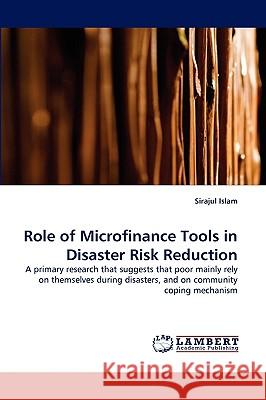Role of Microfinance Tools in Disaster Risk Reduction » książka
Role of Microfinance Tools in Disaster Risk Reduction
ISBN-13: 9783838383675 / Angielski / Miękka / 2010 / 124 str.
This paper presents survey findings from 2368 members in 500 households that were disaster victims, and 23 focus group discussions which took place in five districts in Bangladesh in June, and October, 2008. This study finds disasters to have some common negative effects on households as well as not all that declining trends as perceived generally. The research tentatively suggests, poor households under stressful conditions, either during or post-disaster situations mainly rely on themselves, and on community coping mechanism than to any public or private assistance. Both government and microfinance institutions provide little support to the people prepare for the onslaughts, or rehabilitation needs of the disaster victims.
This paper presents survey findings from 2368 members in 500 households that were disaster victims, and 23 focus group discussions which took place in five districts in Bangladesh in June, and October, 2008. This study finds disasters to have some common negative effects on households as well as not all that declining trends as perceived generally. The research tentatively suggests, poor households under stressful conditions, either during or post-disaster situations mainly rely on themselves, and on community coping mechanism than to any public or private assistance. Both government and microfinance institutions provide little support to the people prepare for the onslaughts, or rehabilitation needs of the disaster victims.











